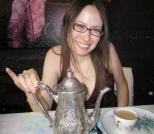She was right, of course. I am definitely of the optimistic persuasion, as I trust you may have noticed. I hadn’t realized that optimism was such a distinguishing trait for me, though, until hearing about it from the outside. So I’ve been spending a lot of time pondering the nature of optimism.
Part of it may well be disposition. Optimism comes naturally to me. I’ve said before that my neutral state, if nothing much good or bad is going on, tends to be set on the positive side. Little things make me inordinately happy. I get an e-mail from a friend and I’m already smiling. My dog does something cute and I’m happy. I think about the gingerbread cookie I’m going to have for lunch and I’m filled with anticipation all morning long.
Then comes the filtering. We all do it, although some of us are better at it than others. Filtering is the reason there can be horrible catastrophes somewhere else and we can continue through our day as if we don’t know that somewhere else people are dying in misery. Filtering is forgetting or distracting yourself or not really listening. Filtering is auto-pilot and prioritizing. It can be enormously helpful or greatly hurtful. I’m not always so talented at the filtering, which is why I sometimes have to take breaks and go months at a time without looking at a newspaper.
Once we’re done filtering, then we’re left to deal with whatever is left. And Wesley wasn’t lying in The Princess Bride when he told Buttercup that life is pain. At certain points all of us are called upon to deal with illness, with injury, with disappointment, with grinding monotony. We experience setbacks, we make mistakes, and people don’t always treat us as well as they should. We worry about our loved ones, our finances, current affairs. When I was a kid we all worried about nuclear apocalypse. Now we’re terrified of an environmental apocalypse instead. If we look for something wrong or painful or scary, we’re sure to find it.
At this point, at least for those of us who don’t filter so well, we have two choices. We can let the negativity pull us down and learn to expect the worst. Pessimism is a coping mechanism, nothing more. If we routinely expect the worst, we can protect ourselves from disappointment because we didn’t think anything good was likely to happen anyway. It’s a thought process meant to cushion the blows of life. The problem with it is that it also tends to keep us confined into a little box in which nothing much is possible. It encourages us to be resigned instead of to strive.
Our other choice is optimism – to take what we find and make the best of it. Just like pessimism, this is a coping mechanism. It is the choice, in the face of the dark, to strive for better, which illustrates the inherent belief that things can be better. Someone treats us badly, and we try to understand why so we can learn from their mistakes and become better people ourselves. We get a rejection and we double our efforts to improve. We see problems in the world and we start from the assumption that maybe something can be done to alleviate them, that maybe there’s even something we can do personally that might help a little bit. It’s believing that the little things, like telling someone to have a nice day and meaning it, or complimenting someone on a job well done, will add up to make a difference in the world around us.
Sometimes when I am faced with a particularly daunting truth, I am a pessimist. Sometimes I get tired and wonder if I’m making any progress. I worry that I’m not making even a small difference. I don’t know how I can possibly surmount what I see in front of me. For those of us who either can’t or won’t filter, it is easy to become daunted and overwhelmed. But as much as I can, I try to choose optimism because when I do, I’m happier. I’d rather live a life infused with meaning. I’d rather have the bittersweet comfort of hope. I’d rather make the gamble that the little things sometimes matter after all.



